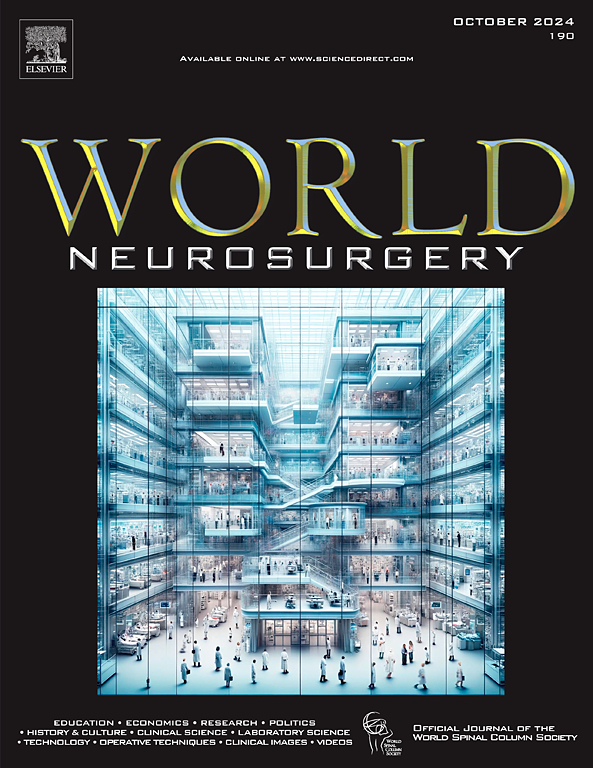Systematic Analysis for the Reason of Revision-Surgery After Non-Total En Bloc Spondylectomy Open Surgery Among Spinal Metastatic Tumor Cases: A Retrospective Study
IF 1.9
4区 医学
Q3 CLINICAL NEUROLOGY
引用次数: 0
Abstract
Objective
This study examines patients with metastatic spinal disease undergoing non-total en bloc spondylectomy, focusing on revision surgery reasons and its effectiveness in treating spinal instability, neurological issues, and pain.
Methods
This study conducted a retrospective case series in a single center and included 344 patients with metastatic spinal tumor who underwent non-total en bloc spondylectomy open surgery between 2013 and 2021 and were followed up for >2 years.
Results
Of 344 patients, 20 (7.1%) had revision surgery due to delayed infection (n = 1), fixation loosening (n = 2), and tumor recurrence (n = 17). The revision group had lower rates of radiotherapy (35%) and long-segment fixation (45%) than the unrevised group (60.2%, 74%; P < 0.001). Decompression surgery had the highest revision rate (15.8%), followed by vertebrectomy (8.9%), separation surgery (4.7%), and hybrid surgery (2.3%). Postoperative scores and survival rates were improved in the revision group (median survival 32 vs. 11 months; P < 0.05).
Conclusions
Long-segment fixation with radiotherapy may reduce revision surgery need and extend the time between surgeries. Hybrid or separation surgeries lower the likelihood of revision. Revision surgery can relieve pain and improve neurological function. Patients in the revision group have longer survival times.
脊柱转移性肿瘤非全切脊柱开放手术后翻修手术原因的系统分析:一项回顾性研究。
研究目的本研究对接受非全切全脊椎切除术的转移性脊柱疾病患者进行研究,重点关注翻修手术的原因及其在治疗脊柱不稳、神经问题和疼痛方面的效果:该研究在一个中心开展了一项回顾性病例系列研究,纳入了2013年至2021年间接受非全切全脊椎切除开放手术的344例转移性脊椎肿瘤患者,随访时间>2年:在344例患者中,20例(7.1%)因延迟感染(1例)、固定松动(2例)和肿瘤复发(17例)而进行了翻修手术。翻修组的放疗率(35%)和长段固定率(45%)低于未翻修组(60.2%,74%;P结论:放疗长段固定可减少翻修手术的需求,延长手术间隔时间。混合或分离手术可降低翻修的可能性。翻修手术可减轻疼痛并改善神经功能。翻修组患者的存活时间更长。
本文章由计算机程序翻译,如有差异,请以英文原文为准。
求助全文
约1分钟内获得全文
求助全文
来源期刊

World neurosurgery
CLINICAL NEUROLOGY-SURGERY
CiteScore
3.90
自引率
15.00%
发文量
1765
审稿时长
47 days
期刊介绍:
World Neurosurgery has an open access mirror journal World Neurosurgery: X, sharing the same aims and scope, editorial team, submission system and rigorous peer review.
The journal''s mission is to:
-To provide a first-class international forum and a 2-way conduit for dialogue that is relevant to neurosurgeons and providers who care for neurosurgery patients. The categories of the exchanged information include clinical and basic science, as well as global information that provide social, political, educational, economic, cultural or societal insights and knowledge that are of significance and relevance to worldwide neurosurgery patient care.
-To act as a primary intellectual catalyst for the stimulation of creativity, the creation of new knowledge, and the enhancement of quality neurosurgical care worldwide.
-To provide a forum for communication that enriches the lives of all neurosurgeons and their colleagues; and, in so doing, enriches the lives of their patients.
Topics to be addressed in World Neurosurgery include: EDUCATION, ECONOMICS, RESEARCH, POLITICS, HISTORY, CULTURE, CLINICAL SCIENCE, LABORATORY SCIENCE, TECHNOLOGY, OPERATIVE TECHNIQUES, CLINICAL IMAGES, VIDEOS
 求助内容:
求助内容: 应助结果提醒方式:
应助结果提醒方式:


